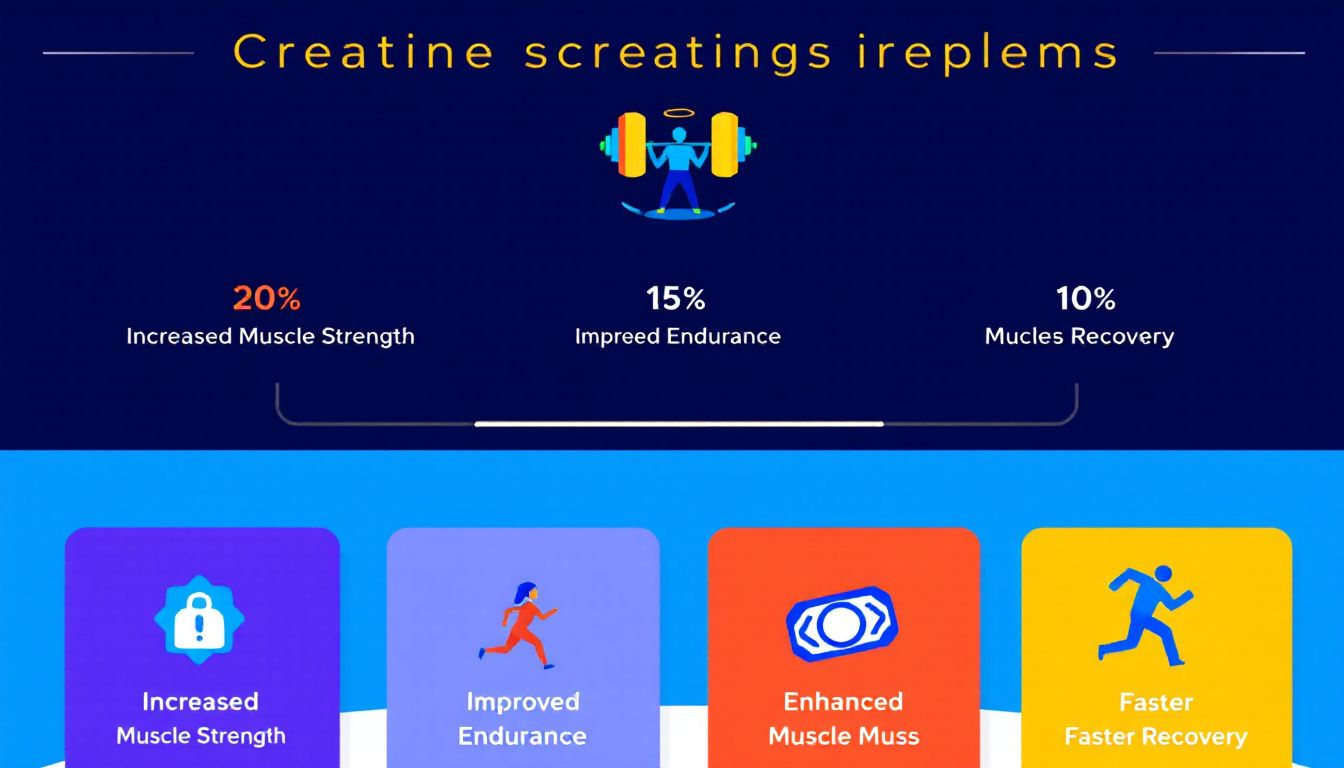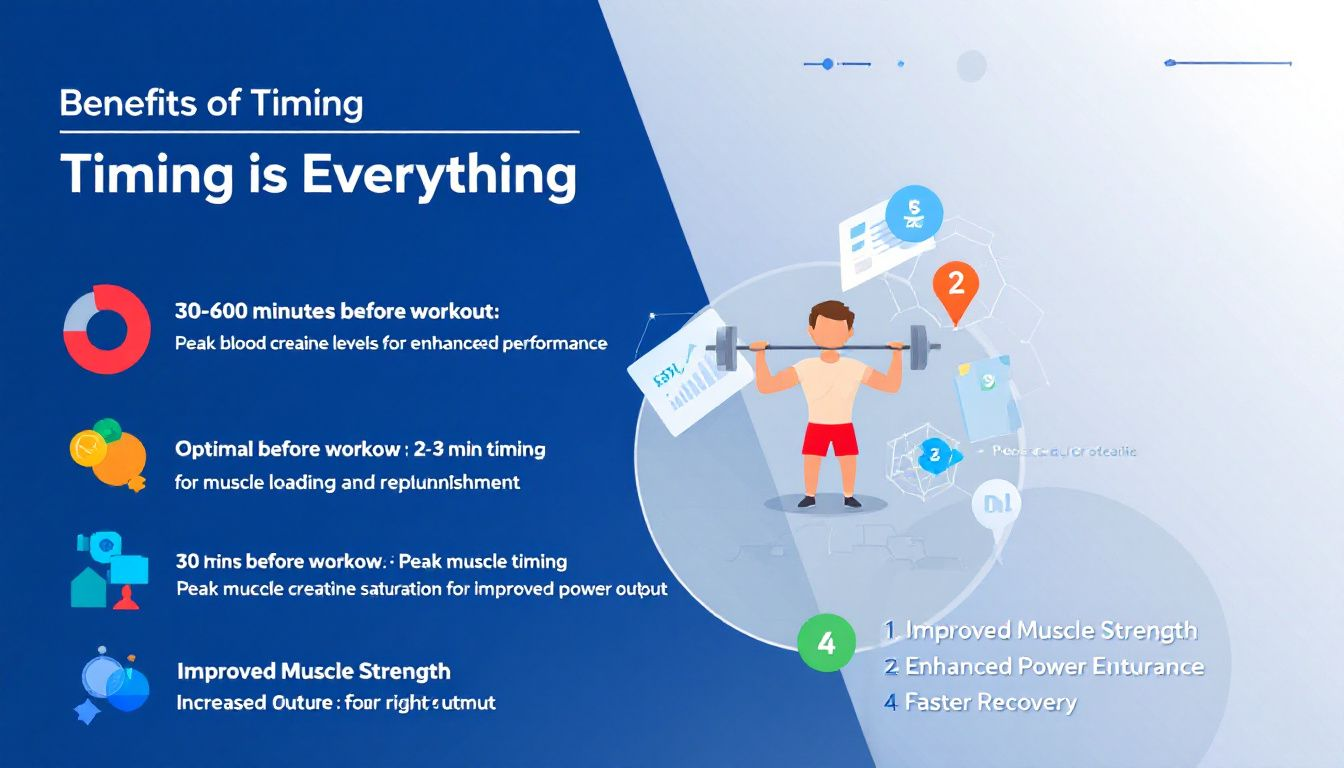
- by Grant Parker
Optimal Timing: The Best Time to Take Creatine for Maximum Results
- by Grant Parker
When is the best time to take creatine? Whether you aim for better workouts or quicker recovery, timing plays a key role. Learn the optimal times to take creatine for maximum benefits.
Creatine supplementation enhances energy production during high-intensity exercise, significantly improving performance and muscle gains.
Taking creatine before workouts optimizes muscle power and strength, while post-workout intake aids in recovery and muscle repair.
Consistent creatine intake, including on rest days, is crucial for maintaining elevated muscle creatine levels, supporting long-term performance and muscle growth.

Creatine is a natural compound. It is found in red meat and muscle tissue. It is an amino acid that plays a crucial role in energy production, particularly during high-intensity exercise. Approximately half of the creatine your body needs comes from dietary sources rich in protein, such as red meat and seafood. The rest is produced naturally by the liver, kidneys, and pancreas, supplying around 95% of it to skeletal muscles. The body's creatine is stored not only in skeletal muscle but also in the brain, kidneys, and liver, where it supports various physiological functions. Additionally, amino acids are essential for various bodily functions.
When you engage in activities like sprinting or weightlifting, your muscles rely heavily on ATP (adenosine triphosphate) for energy. Creatine aids in the production of ATP, releasing energy for optimal muscle function, with skeletal muscle being the primary site of creatine storage and utilization. This makes creatine an essential supplement for athletes looking to enhance their performance in strength, bodybuilding, and team sports.
Creatine supplementation can significantly increase muscle creatine stores, ensuring that your muscles have a readily available energy source during intense activities. This leads to improved exercise performance and greater muscle gains. The ability of creatine to enhance quick burst energy is why it is so highly regarded in the fitness community. Creatine has seen widespread adoption in the fitness industry for enhancing athletic performance, strength, and muscle building.
High muscle creatine levels are vital for those involved in high-intensity sports or resistance training. Creatine supplements, particularly creatine monohydrate, have been extensively studied and proven to be effective in increasing muscle creatine stores and improving overall physical performance. Research also shows that creatine supplementation can have positive effects on cognitive function and brain health.
Creatine powder is the most common and convenient form used by athletes and fitness enthusiasts due to its quick absorption and ease of mixing with water.
Overall, the potential benefits of creatine supplementation include increased muscle energy, improved physical performance, enhanced cognitive function, and emerging research suggests broader health effects.
Creatine is a naturally occurring compound found primarily in muscle cells, where it plays a vital role in supporting high-intensity, short-duration activities like weightlifting, sprinting, and explosive sports. When you engage in these types of exercises, your muscles require rapid bursts of energy, which is where creatine supplementation comes into play.
Taking creatine supplements increases your muscle creatine stores, allowing your muscles to hold more phosphocreatine—a high-energy molecule essential for quickly regenerating ATP (adenosine triphosphate). ATP is the primary fuel source for muscle contractions during intense exercise. By boosting the availability of phosphocreatine, creatine supplementation enables your muscles to perform more work, delay fatigue, and recover faster between sets, leading to greater muscle gains and improved sports performance.
The process of creatine uptake involves saturating muscle cells with creatine, which enhances the body’s ability to produce energy during resistance training sessions and other high-intensity workouts. This is why creatine monohydrate, especially in powdered form, is a staple in sports nutrition for athletes and gym-goers aiming to build muscle mass and improve physical performance.
The International Society of Sports Nutrition and other leading organizations have published sports nutrition position stands confirming that creatine supplementation is both safe and effective. Scientific evidence consistently shows that creatine works to enhance exercise performance, support lean muscle mass development, and improve overall body composition. Whether you’re following a loading phase to quickly saturate your muscles or simply taking a daily maintenance dose, the key is consistent supplementation to maintain elevated muscle creatine stores.
Ultimately, creatine is one of the most researched and reliable dietary supplements available. Its proven benefits for muscle strength, power, and recovery make it an essential part of any sports nutrition regimen for those looking to maximize their training sessions and achieve greater muscle gains. Whether you’re a competitive athlete or a dedicated gym-goer, creatine can help you reach your fitness goals by supporting optimal muscle function and performance.

Taking creatine before your workout strategically maximizes its benefits. Research indicates that pre-workout creatine supplementation may enhance muscle strength and power, making it particularly beneficial for high-intensity interval training, weightlifting, and short-distance running. The timing of creatine supplementation is a key factor in maximizing these benefits.
One of the key advantages of taking creatine before exercise is the maintenance of elevated creatine levels during intense physical activity. This helps sustain high circulating creatine levels when your muscles are working at their peak. The best time to take creatine is approximately 30 minutes before your workout, which allows it to be absorbed and ready to boost your performance.
Exercise increases blood flow, which enhances the absorption of creatine in your muscles. Additionally, muscle contraction during exercise further stimulates creatine uptake into muscle cells by activating the Na+-K+ pump. Taking creatine before your workout ensures effective transport to your muscles, optimizing its impact. This can result in improved exercise performance, allowing you to lift heavier weights, sprint faster, or endure more intense workouts.
Pre-workout creatine supplementation can also help maintain high circulating creatine levels during peak Na+-K+ pump activity. This is crucial for activities that require quick bursts of energy and maximal muscle contractions. Overall, taking creatine before exercise can lead to greater muscle gains and improve sports performance.
While taking creatine before a workout has its benefits, supplementing with creatine after exercise can also be highly effective.
Post-workout creatine intake supports muscle recovery by:
Helping to repair micro-tears in muscle fibers, which occur during intense exercise
Reducing muscle damage and soreness
Enabling you to bounce back quicker for your next workout
Research shows that post-exercise creatine supplementation may lead to greater increases in lean mass and fat free mass, making it especially effective for those aiming to improve body composition and muscle hypertrophy.
Regular creatine supplementation post-workout has been shown to aid in the recovery process and enhance muscle mass. Maintaining high creatine levels ensures your muscles are energized and ready for subsequent high-intensity exercise. Taking more creatine post-workout may enhance muscle creatine uptake and support greater recovery. This is particularly important for athletes who train frequently and need to optimize their recovery.
Research indicates that post-exercise creatine supplementation can be more beneficial for muscle recovery and growth compared to pre-exercise intake. This is because the body is in a state of heightened nutrient absorption post-workout, making it an ideal time to replenish creatine stores.
The chronic consumption of creatine not only aids in recovery but also leads to increases in total muscle creatine and muscle mass, helping you build more muscle over time. This enhances overall performance and body composition, providing athletes with a competitive edge.
It’s not just workout days where creatine supplementation is important; taking creatine on rest days is equally crucial. Consistent intake of a maintenance dose of 3-5 grams of creatine daily on rest days helps keep muscle saturation intact, preventing the decline in creatine levels. This ensures that your muscles remain primed for optimal performance in future workouts.
Maintaining high muscle creatine levels on rest days is essential for muscle growth and overall body composition. Increased hydration of muscle cells, facilitated by creatine, may contribute to muscle growth and a reduction in dehydration risks. This consistency in creatine supplementation provides the best results for muscle mass and overall physical performance.
Gym-goers and athletes should incorporate creatine into their daily routine, even on rest days. This helps maintain the benefits of creatine supplementation, ensuring that your muscles are always ready to perform at their best.
Staying hydrated is also crucial when taking creatine, as it aids in the effective absorption and utilization of the supplement. Following a consistent creatine supplementation protocol maximizes muscle gains and overall fitness results.

Knowing the correct dosage and forms of creatine is crucial for maximizing its benefits. The loading dose of creatine typically consists of taking 20 to 25 grams per day, divided into several servings, for five to seven days to quickly saturate muscle creatine stores. This phase is designed to rapidly increase muscle creatine stores. It’s suggested to divide the daily dose into four or five servings to ensure optimal absorption.
After the loading phase, a daily maintenance dose of 3 to 5 grams is recommended to maintain elevated muscle creatine levels. Larger athletes may require a maintenance dose of 5 to 10 grams per day, depending on their body weight and training intensity.
Creatine powder is the most widely used and researched form of creatine supplement, known for its convenience and quick absorption when mixed with water. Creatine monohydrate is particularly popular due to its proven effectiveness and affordability. It’s important to follow a proper supplementation protocol to achieve the best results.
Both physically active young adults and older adults can experience performance and muscle gains from proper creatine protocols. When designing resistance training programs, repetition maximum (RM) is often used to set training intensity and volume, which can influence creatine needs.
Whether you choose powdered creatine monohydrate or another form, consistency is key. Taking creatine daily, as part of your fitness regimen, ensures that your muscle creatine stores remain high, supporting your performance and muscle gains.
For authoritative guidelines on creatine supplementation, refer to the sports nutrition position stand published by the ISSN.
Several factors can influence the effectiveness of creatine supplementation, particularly creatine uptake. Increased blood flow to muscles during exercise can significantly enhance the delivery and retention of creatine. When muscle blood flow increases, creatine uptake is maximized, ensuring that your muscles benefit fully from the supplement. These processes represent key physiological mechanisms that underlie the effectiveness of creatine supplementation, as they directly impact muscle creatine retention and adaptation.
Ingesting carbohydrates alongside creatine may enhance muscle creatine uptake by elevating insulin levels. Insulin promotes creatine transporter activity, facilitating the efficient transport of creatine into muscle cells. Combining creatine with protein and carbohydrates can further optimize creatine stores, enhancing muscle gains and physical performance.
The initial creatine levels in a person’s muscles also significantly affect how much additional creatine can be stored after supplementation. Factors such as baseline muscle creatine content, habitual dietary intake of creatine, and exercise can modify the performance benefits of creatine supplementation.
Muscle contractions during exercise can stimulate creatine transport mechanisms, potentially leading to greater creatine accumulation. This underscores the importance of incorporating creatine into your pre and post-workout routines to maximize its benefits.
Athletes aiming to maximize performance can benefit from combining creatine with other supplements. Creatine uptake can be enhanced by its co-ingestion with carbohydrates, which may increase insulin levels and promote creatine transporter activity. This synergy can lead to greater muscle creatine stores and improved performance.
Carbohydrates and protein can enhance the benefits of creatine supplementation, boosting creatine retention and muscle mass. Combining creatine with protein powder, for example, increases creatine retention, enhances performance, and promotes muscle growth. This comprehensive approach to dietary supplementation can optimize the effects of creatine on muscle gains and physical performance.
Incorporate creatine with other dietary components to enhance its effectiveness when developing a supplementation protocol. Practical tips for combining creatine with other supplements include taking creatine with a post-workout shake containing protein and carbohydrates, ensuring that your body receives the nutrients it needs to maximize performance and recovery.
Creatine supplementation is generally safe for healthy adults and can be taken long-term without adverse effects reported. However, it’s important to be aware of potential side effects, which may include weight gain, muscle cramps, and stomach discomfort. These side effects are typically mild and can be managed by following the recommended dosage.
Taking more than the recommended dosage of creatine can heighten the risk of side effects, including muscle breakdown and kidney damage. Excessive dosages can also potentially impede the body’s natural production of creatine. Therefore, it’s crucial to adhere to the suggested doses and consult with a healthcare provider before starting creatine supplementation.
Individuals with pre-existing kidney issues, high blood pressure, or liver disease should refrain from using creatine. Additionally, those taking specific medications or who have conditions that increase the risk of kidney damage should avoid creatine supplementation. Proper hydration is also essential when taking creatine, especially when combined with caffeine, to avoid dehydration.

Creatine supplementation has a profound impact on exercise and sports performance, including various creatine benefits in sports nutrition. It helps athletes obtain performance gains by optimizing the energy supply during short-duration, high-intensity exercises like weightlifting and sprinting. This makes it a valuable supplement for those involved in power sports.
Studies indicate that creatine can help athletes perform better by improving their strength and enabling them to tolerate more intense activities. The combination of creatine and carbohydrates may also result in lower blood lactate levels during high-intensity exercise, further enhancing performance.
Overall, creatine supplementation increases available energy, prolongs work capacity, and delays muscle fatigue. This allows athletes to train harder and longer, leading to greater muscle gains and improved sports performance.
In summary, understanding the optimal timing for creatine supplementation is crucial for maximizing its benefits. Whether you choose to take creatine before or after your workouts, or even on rest days, consistency is key. Pre-workout creatine can enhance muscle strength and power, while post-workout creatine supports muscle recovery and growth.
Taking creatine on rest days helps maintain high muscle creatine levels, ensuring that your muscles are always ready for optimal performance. Following a proper supplementation protocol, including the loading and maintenance phases, is essential for achieving the best results.
Remember to consider factors that influence creatine uptake, such as increased blood flow during exercise and the co-ingestion of carbohydrates and protein. By combining creatine with other supplements and adhering to safety considerations, you can unlock the full potential of creatine and achieve your fitness goals.
Taking creatine shortly before or shortly after your workout is generally considered most effective for maximizing its benefits. Consistency in timing is key, whether you take it pre-workout, post-workout, or at another convenient time.
Taking creatine post-workout is generally more effective for building mass and strength, although pre-workout supplementation can still provide benefits, especially when combined with caffeine. Prioritizing post-workout intake is advisable for optimal results.
It's best to avoid mixing creatine with non-steroidal anti-inflammatory drugs (NSAIDs), caffeine, diuretics, cimetidine, or any drugs that affect kidney function, as these combinations could increase the risk of kidney damage. Always consult a healthcare professional before combining supplements with medications.
It's advisable to take 20 to 25 grams of creatine daily during the loading phase, split into four or five servings over 5 to 7 days for optimal results.
Yes, it's beneficial to take a maintenance dose of 3-5 grams of creatine on rest days to maintain muscle saturation and optimize your performance in future workouts.
Share:
Top 10 Best Creatine for Women: Enhance Performance and Muscle Growth